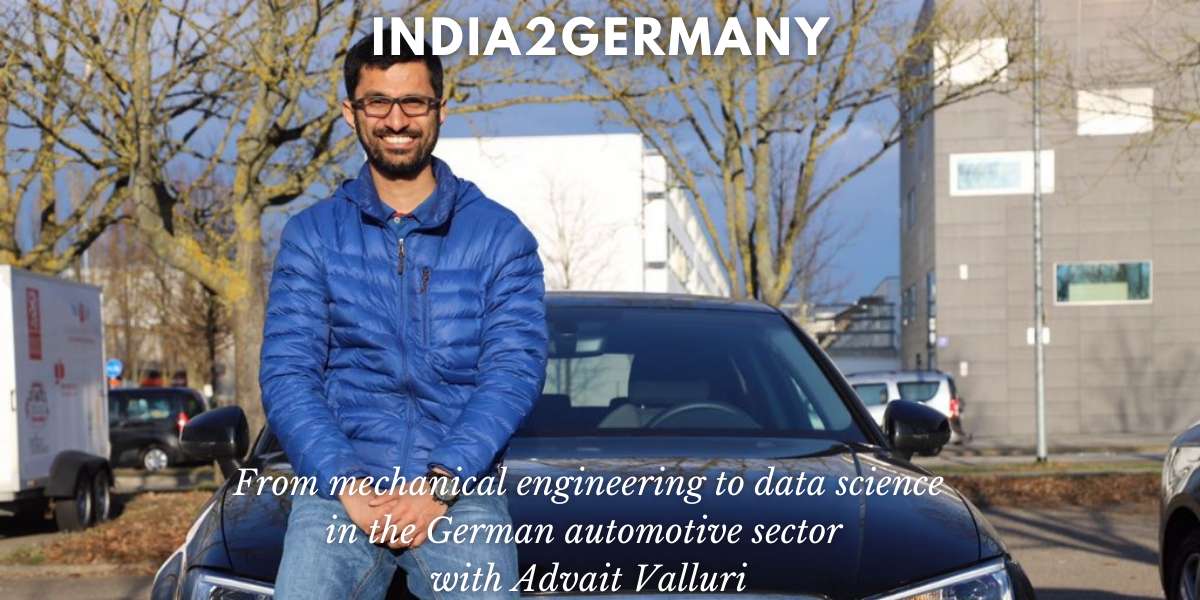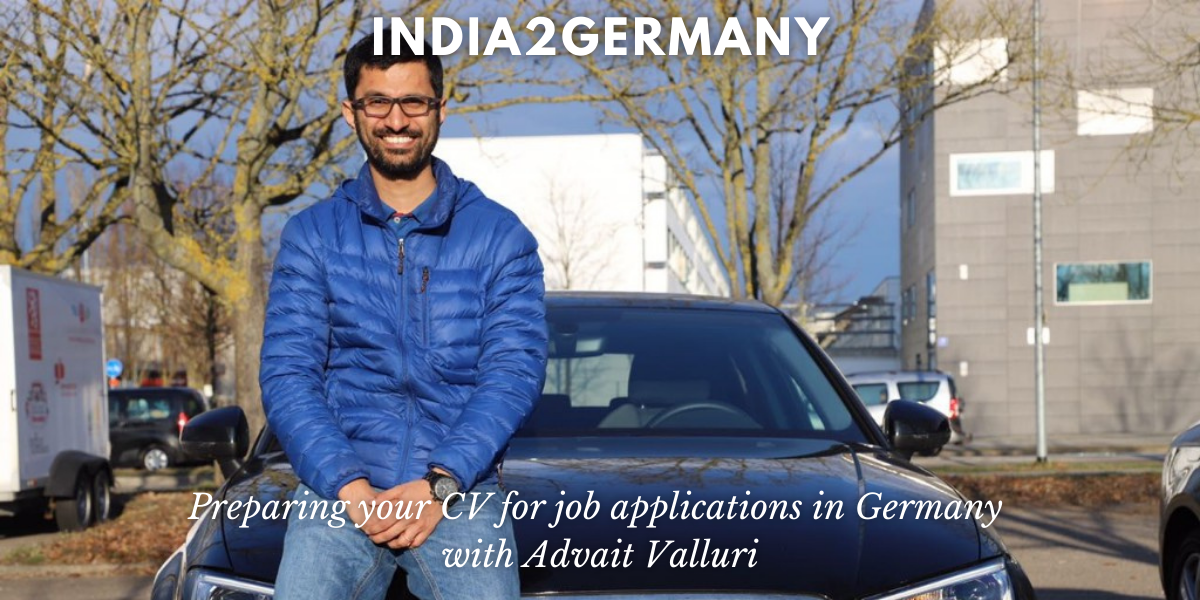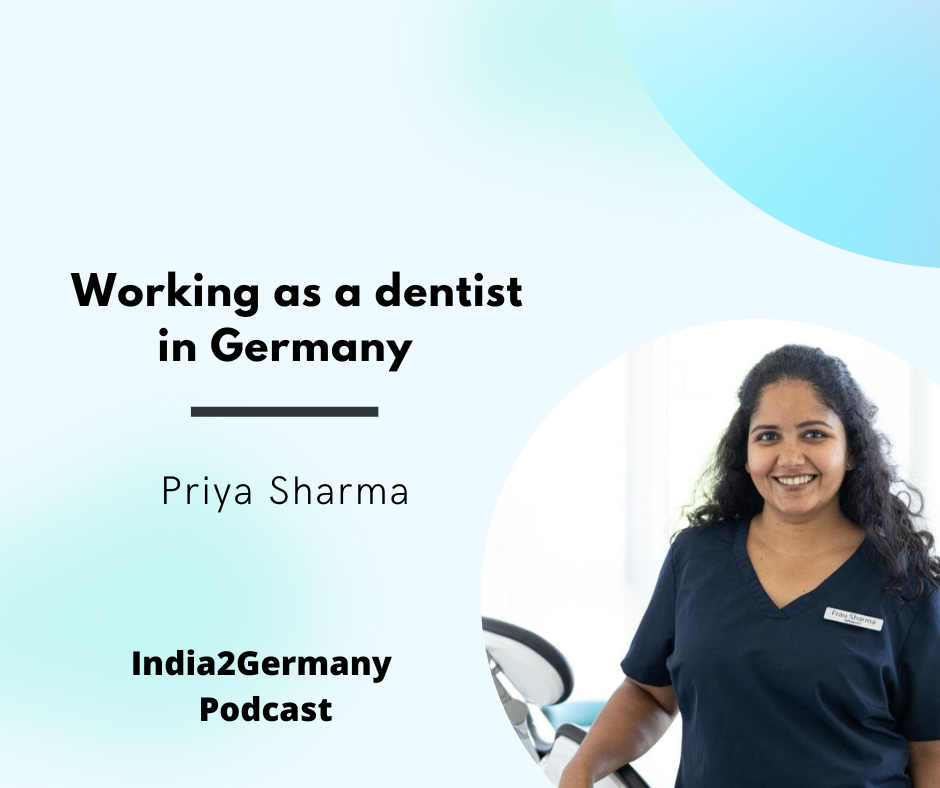
From mechanical engineering to data science in the German automotive sector with Advait Valluri
Advait Valluri, Data Analytics Project Manager at Audi in Ingolstadt, Germany, shares his experience of working as a mechanical engineer in the automotive sector in Germany and transitioning from mechanical engineering to data science.
Advait Valluri, Data Analytics Project Manager at Audi in Ingolstadt, Germany, shares his experience of working as a mechanical engineer in the automotive sector in Germany and transitioning from mechanical engineering to data science. Advait did his masters in Automotive Engineering from the RWTH Aachen University and started his career as a trainee at Audi. He talks to us about how he is using data science in his current role and gives very useful advice to people aspiring to work in the German automotive sector, including current job opportunities, important skills and available career paths in the automotive sector.
Hit Play to listen to this conversation and Follow to get notified about upcoming episodes.
📬 Get the latest India2Germany articles via email 📨
What are your responsibilities as Project Manager in Data Analytics at Audi currently?
I am currently working in Chassis R&D. My main task at Audi is to manage multiple projects at the same time. I work within R&D in the pre-development area. Pre-development area is the initial stage of development of vehicles. We are working on multiple projects on different topics which include developing new suspension concepts, and developing new control systems. My focus lies mostly in data analytical projects for developing new use cases in the Chassis R&D.
My main responsibility is to generate results under time, resource and budget constraints, and to ensure that these results are achieved within a certain period of time to ensure that decisions can be made about if this technology should go into further production or not.
That is the main task of pre-development per se. We develop proofs of concept for new technologies and then present it to higher management. A decision based on this is made if the product goes into production. This is my main responsibility.
Also listen to our conversation with Advait on preparing your CV for job applications in Germany (link below).

What is Chassis and Chassis R&D about?
The word chassis is often misconceived. For instance in India, chassis would probably refer to the vehicle body, but as far as the German automotive industry is concerned, chassis is probably a very crude translation of the word Fahrwerk. In this sense, it actually means the entire structure, which is not visible in the first sight of a vehicle. If you remove the vehicle body from the top, what remains is generally the Fahrwerk, which is the chassis and power train. The chassis is mostly comprised of brakes, tyres, suspension, springs, dampers, etc. and also the control systems controlling these components. So you may translate it as suspension development. It is basically the part that actually bears the load and supports the car, thereby contributing the longitudinal and the lateral motion of the vehicle. The brakes for example are required to brake the vehicle. We work in extreme close contact with the powertrain developers who are responsible for generating the power and we are responsible to brake the vehicle.
Give your job search a boost! Get expert feedback on your CV and cover letter from Advait:

What kind of projects do you work on?
What we do in the pre-development is that we identify a certain technology which is in the market right now. So, I work with big data in the chassis domain to develop various machine learning models. A proof of concept would generally consist of first doing market research and identifying the key factors which are driving these technologies in the market, what our competitors are doing and once we identify this then we draw out a project plan for how much money do we need, what are the resources we need, and how many people have to work on this. Once that is set, we apply for a certain budget, which needs to be available to execute the project. After this, we start developing the models using vehicle sensor data and there will be many tasks which will comprise the project, like we may have to drive the vehicle to generate the data and develop the models. Once the models are fixed, we develop a prototype which shows the technology that has capacity to come into market and once this is done, it is named as proof of concept and based on this proof of concept, a decision is made if we continue or not.
What kind of techniques in machine learning do you use for developing these models?
In the automotive sector, especially in the Chassis area, it is very important to know the current state of the parts. We were trying to develop wear models. We generally stick to developing supervised machine learning models and this means that we need to know what the current state of the parts is, during the training phase. So in order to do this, we drive the car with good and defective parts, noting down what data belongs to which state of the vehicle. And once we have this information available, we develop the model and then test it on unseen data, which is a typical machine learning workflow. So our main task is probably using supervised machine learning models. Presently we use something like support vector machines or neural networks. We are trying out different models. We do not yet know what will be the best choice, but that is part of the project to find out, what is the best thing to try.
Do any of the proof of concepts make it into production?
My project is still in the development phase. But in the past, we had many projects, which were developed in pre-development, and a strategic decision was made to bring this into market. Then finally, they were developed into series production. The scenario of series development is quite different from pre-development, because in series development we have suppliers, we need to talk to suppliers, they need to stick to our testing procedures, and so on and so forth.
A classic example of this workflow is the rear wheel steering in the new Audi A8. The rear wheel steering started off as a pre-development project in my department around six to seven years ago. It went through a lot of iterations in my project, a decision was made and then eventually it came out into the series vehicles. So today, you can see the rear wheel steering in the Audi A8. And that is one of the products which came from us.
We started focusing more on data analytics for the past three years. And I was one of the first few who took up this at Chassis R&D.
Could you tell us what brought you to Germany from India?
I am originally from Hyderabad, a city in southern India. After my schooling I did my Bachelor’s degree in Mechanical Engineering from Osmania University, a very reputed university in India. After my Bachelor's degree I wanted to continue Master's degree. While I was looking for different options, my first priority was Germany. I wanted to be an automotive engineer from the beginning, so Germany was the right choice to study automotive engineering. I also wanted to come to a place where everything was a new, including the language, etc. I looked for a challenge and this drove me to Germany.
I also looked at options in the US but the courses in the US are expensive in addition to the visa issues. This was why Germany for me was a better choice and that's how I ended up here. I came to Aachen and I did my Master's in automotive engineering at RWTH Aachen University. Immediately after my master's I started looking for jobs and it worked out at Audi. So that is how I landed up in Audi and I am currently working there for the past six and a half years, mostly in the Chassis development. I started off as a trainee and did a graduate trainee program for one year. Then I moved to the Chassis Pre-development and ever since I have been there.
The experience has been very enriching. Of course the language and the new society was probably one of the reasons for my decision. The financial aspect was also definitely the other. For me Europe is more interesting than the US. In the US probably one will end up meeting a lot of Indians and not get to interact much with the international community. I wanted to avoid this and try out something completely new. This was one of the main reasons for moving to Germany. The language in the US is English, again as we were brought up with English background there is nothing new to explore on the language front. Coming to Germany I got to learn a new language. Of course, the main motivation is that Germany has the best automotive industry in the world. These were the factors which pushed me to come here.
How important is it to know German to work in the automotive industry in Germany?
In many traditional German firms you cannot do without German. It is extremely important that you communicate, read and write in German.
I am very comfortable in German. All our presentations are held in German and work is mostly in German only. English is almost nonexistent. After I moved to Germany I started learning German as part of my course at the university, because it was one of the prerequisites for me to pass the Masters exam. And that is where I picked up German. For me the biggest difference was that I was living in hostel with a lot of German students.
In my personal opinion learning German just through a course is not going to help; you need to practice it as much as you can. I had the good fortune of having a lot of German friends in my hostel and I had taken it upon myself that I would only speak in German. I had even requested some of my close friends to correct me if I made mistakes.
And over a period of six months to one year my German learning curve was exponentially growing because of the help that I received from them. That was a major factor; parallel to that you learn the theory in class. By implementing it in practice with people, it was the best way to learn.
It is extremely important to know German in Germany. Many people underestimate this because a lot of courses today are being offered in English. All international students who aspire to come to Germany think that the courses are in English, so they don’t have to learn German. To a certain extent it is probably even true, once you come here all your professors and other students in the university speak English, so you don't really feel the need. But the moment you step out of the university and have to go to the supermarket or need to get a phone contract or an internet contract all documentations are in German. Not knowing German is a big disadvantage.
Somebody who speaks German stands a much better chance of getting a job, an internship or generally getting accustomed to life quicker in Germany. In my opinion language is of utmost importance.
What is it like to work in the automotive sector in Germany?
I started studying at the Institute for Automotive Engineering at RWTH Aachen, and somehow it happened that I finished my internship and my Master's thesis in the same field. And my employment is also in the automotive sector. To be frank, automotive sector is probably one of the most stable industries in Germany. Due to COVID-19, the entire world is affected. The aviation industry almost went bankrupt and the German government had to bail out Lufthansa. In contrast, all automotive companies like Volkswagen and BMW have been stable and there have been less layoffs in these companies where the employees still continue getting their bonuses and salaries. From that perspective, the automotive sector provides stable job in Germany.
Studies disclose the fact that nearly 60% of Germany's economy is indirectly or directly dependent on the automotive sector. Just not the OEMs,the suppliers and their suppliers, to all the way down to people who are mining aluminum or steel. Somehow they are all supplying to the automotive industry. It is extremely comfortable sector to work with. The employee contracts are very comfortable. The work life balance is amazing. The job is stable with a stable salary. A lot of innovation happens in this area. So if one is a mechanical or electrical engineering geek, this is the best place to work.
How did you make the transition from mechanical engineering to data analytics?
I started off as a trainee. During this phase I had the opportunity to work for different business areas. I worked for the central project management, purchasing department, marketing department, sales, service and other departments. This helped me to build a strong network with people. Using this network I was able to find a job that I was really interested in. Once there I initially started off just as a development engineer, which meant there were other project leaders working on different projects and I had to assist them in some of the tasks. After one to two years, I had the opportunity to apply for my own projects and get them budgeted. That is how I started off with one or two projects.
After two and a half to three years, my boss came to me and said - We want to try out something new in Data Analytics. Nothing has been done before in Chassis R&D. Would you be interested? This was the opportunity which the boss gave. I had no idea about machine learning or AI. But I took it because that was kind of an opportunity for me to grow personally and also professionally. I spent a lot of time learning what is AI, what is machine learning and then finally had the opportunity to grow as a project manager through this phase. I feel one needs to grab the opportunity by taking the initiative from one’s side when given by higher management and I chose that. Now I am doing this project management work in data science. Data science is pervasive. You can really apply data science anywhere and I think data is going to be the new gold. It is probably going to be the biggest assets for these enterprises. If you are a data scientist, I don't think you have to worry about getting employed in Germany.
What are the career options for people with a background in mechanical engineering in the German automotive industry?
Many people who study mechanical or electrical engineering end up doing completely different things. The automotive sector per se is not only concentrated on the core product. The core product of our industry is clearly the vehicle and services around the vehicle in future business models. But in order to build this vehicle there are lot of other facets which need to be considered. For example it starts off from market research and design. You don't really have to be an automotive engineer for that; there are a multitude of options for potential job seekers. For example marketing, sales, controlling and off course production which includes planning, logistics etc. If I had not done data science, I would have continued to be a suspension engineer and doing something in the area of control system development.
What are the important skills for working in the German automotive sector?
Definitely there are a few skills that I would say are pretty specific to the automotive sector. It depends of course on what area you are working in. In R&D for example, we use a lot of software to develop models, to develop new control systems and stuff like that. One of the main skills that I had to pick up after coming here was MATLAB and Simulink, a software suite offered by Mathworks. It is like all pervasive in the automotive industry. Literally, everybody uses MATLAB and Simulink.
Apart from that, depending on the area, especially in the R&D and data analytics area you may have to use, Python or Spark, and similar skills. If you want to enter the professional life in Germany, you should know the basics like Microsoft Office or similar knowledge.
A skill which is perhaps underrated and which I mentioned before is German language. An aspiring student or a person trying to come to Germany should not neglect German language.
I also noticed that the documentation is extremely precise. I use Latex for documentation.This is unheard in India, where everyone uses Microsoft Word. For professional documentation, I would recommend Latex for students to learn.
Would you recommend the Automotive Engineering masters programme at RWTH Aachen?
Yes, definitely, RWTH Aachen is rated as the best university for mechanical engineering in Germany. Especially automotive engineering because there is a long tradition of automotive engineering projects that are in cooperation with the industry. In that aspect, it is an amazing place to study automotive engineering or mechanical engineering. Aachen also offers a lot of other courses in Electronics and Communication and other courses. Apart from that Technical University Munich is also very big and powerful in the university world in Germany. To be frank, it does not matter which university you go in Germany.
The standard is pretty high everywhere, be it the teaching, the library, general facilities, everything is really good.
But still Aachen was my first choice because of the location and its reputation.
Which career opportunities would you recommend for people who are looking to work in the German automotive sector?
If you have the skills I suggested, your chances grow exponentially to find a job. At the moment, a lot of big drastic change is going on in the industry.
A lot of companies are trying to become digital, the traditionally mechanical electronic companies want to be digital, which means there will be a lot of opportunities for people from the IT industry, data analysts etc.
I can give you an example. Audi is part of the Volkswagen group. Recently Volkswagen Group announced that they will form a new company to develop car software in-house. What happened until now was that Audi, Porsche and Volkswagen were all trying to contract suppliers to develop some software product for them. Volkswagen group realized relatively quickly that this is actually inefficient as they belonged to the same group and need similar software. So it makes sense to have one company which takes in requirements from different companies like Audi or Porsche and develops the software platform in-house.
Hence a new company was formed called the Car Software Organization. The major recruitment activities in this company are related to IT and data science. Although it is a company which is catering to the traditional mechanical industry, you don't really have to be a mechanical engineer to get into one of these companies.
If you are looking for jobs at Volkswagen Group, check out our post about jobs at Car Software Organization and subscribe to our newsletter 👇 to stay up-to-date.

📬 Get the latest India2Germany articles via email 📨
So the spectrum of the available jobs within the automotive industry is currently growing. Any field of engineering or science will definitely have some part to play in this industry. So I think people from all fields, all STEM fields especially are encouraged to apply and there are a lot of opportunities. A lot of the workforce which were working on these software projects has now moved to the Car Software Organization but there will be at least a couple of thousand jobs that will open up in the future in the next one or two years for external recruitments for people from outside. And there is also another trend, German is becoming a bit less important and English is trying to grow in the curve since IT field has traditionally been an English speaking field. And so maybe that is also an encouragement for aspiring students. But I still stick to my statement that you need to know German.
What would be your advice for people who are looking to build a career in the German automotive sector?
My advice would be that whatever you do in India especially in terms of your exams or in terms of your projects, make sure that you are very diligent in your work. Make sure that you are fully aware of the work in and out; learn preparation of proper thesis and research, and presenting the results, particularly the skills on documentation. I would definitely suggest people to improve on their documentation skills, from my own experience as my documentation skill was initially very poor when I moved to Germany. Here I improved the skill and it has immense value right now in my job. Professional communication, documentation, and required software skills, like MATLAB and Simulink, are essential if one moves to Germany to the automotive sector. 10 years ago when I was doing my bachelors degree these were not very common in India. I would recommend these skills to anyone in the STEM field to pick up before moving to Germany because then the chances of getting an internship or thesis is very high.
📬 Subscribe to our newsletter to stay up-to-date! 👇
India2Germany Newsletter
Join the newsletter to receive the latest updates in your inbox.







